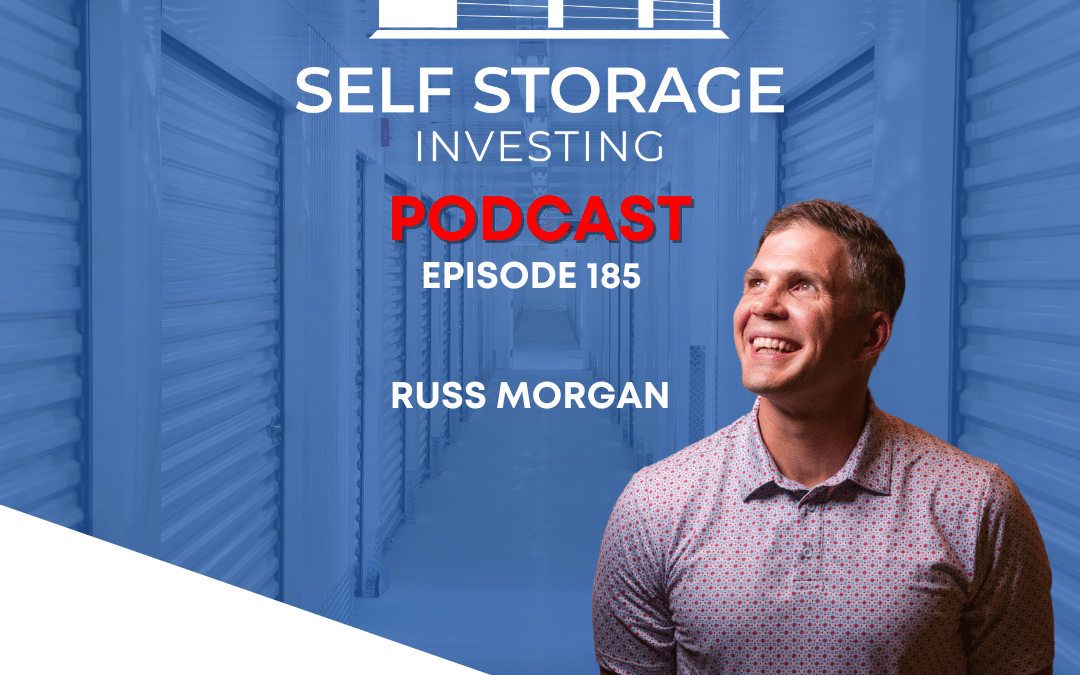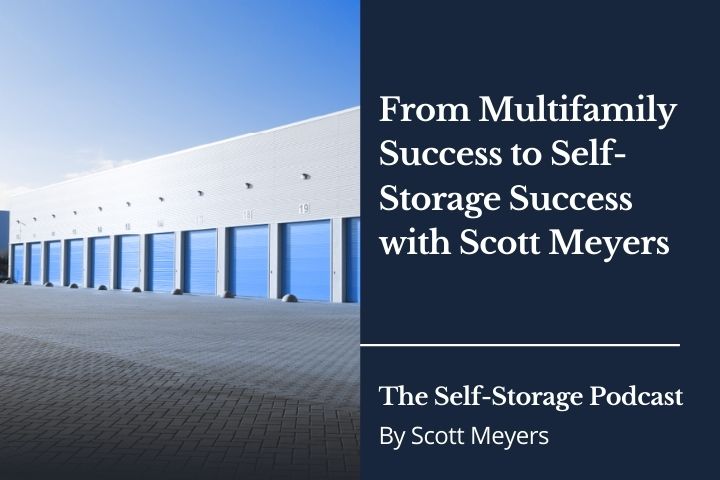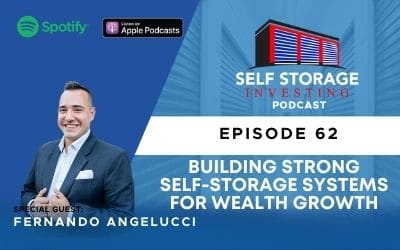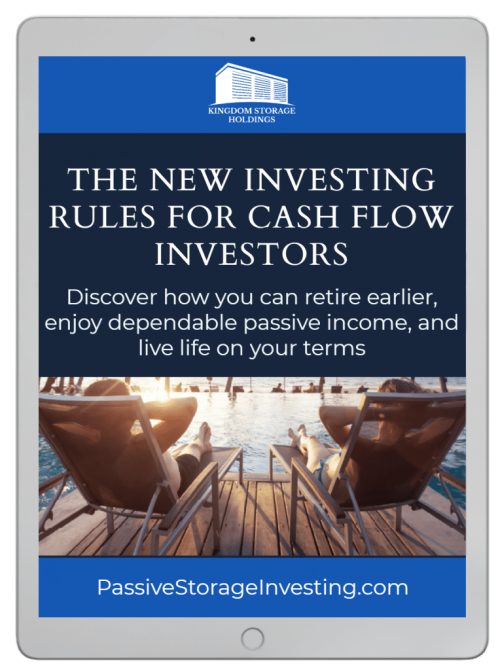Ready to break free from Wall Street’s grip and build real wealth?
In this episode, Scott welcomes Russ Morgan, co-founder of Wealth Without Wall Street, to discuss the power of passive income and alternative investments in achieving financial freedom.
Russ and his partner Joey Mure have created a groundbreaking book that offers a three-step process for success: setting clear goals, developing a personalized plan, and finding support within a community of like-minded investors.
Through their unique approach, Russ and Joey empower readers to align their investments with their individual preferences, risk tolerance, and interests, leading to more engaging and successful outcomes.
From hands-on real estate ventures to hands-off opportunities, they share insights from their thriving community of nearly 9,000 members who are transforming their lives by building passive income streams, leaving a legacy, and making a lasting impact.
WHAT TO LISTEN FOR
03:22 – Three-Step Process for Passive Investing
16:39 – Achieving Financial Freedom
25:33 – Vetting Syndicators and Investment Strategies
35:58 – Growing a Community of Successful Investors
Leave a rating for this podcast with one click
GUEST: RUSS MORGAN Website | Listen to episode 157 with Russ Morgan and Joey Mure
CONNECT WITH US Website | You Tube | Facebook | X | LinkedIn | Instagram F
Follow so you never miss a NEW episode! Leave us an honest rating and review on Apple or Spotify.
Episode Transcript
Announcer [00:00:03]:
This is the Self Storage podcast.
Scott Meyers [00:00:10]:
Hello, everyone, and welcome back to the Self Storage podcast. I am your host, Scott Meyers. And today we have one of the very few repeat guests. We have Russ Morgan with wealth without Wall Street on to be talking about passive income and how to create passive income streams without the use of Wall Street. And so we look to do the same things on our end, investing in self storage. And that’s what I look to do when I make made my exit from planning my retirement and hoping for the best and doing my best in putting sending the money up to the big casino on Wall Street. And so I found a group of individuals, but also some partners and Russ and Joey who are dedicated to the exact same things. And so I’ve been thankful that either I found them, they found us, or it was just fate that we were able to come together and in the beginning have these discussions on each other’s podcasts.
Scott Meyers [00:00:59]:
And then I’ve had the honor and the privilege to come down and visit their mastermind and see what their tribe is like in the community that they are building. And I felt like I was home and I visited a lot of masterminds. I’ve been to a lot of events and a lot of groups, but the dedication that Russ and Joey have, and I’m not just saying this because Russ is about to speak on our podcast, but I will say this to anybody who will listen. The dedication they have to their tribe and the success of their tribe in the community and wanting to do the absolute best by and for them is like nothing I’ve seen before. They truly care about. And they want their tribe to succeed. And being able to successfully retire or retire a spouse or a partner or do the things that they want to do or their God given talents and that where other, other paths that they’ve taken have kept them from achieving. And so, so thankful to have at least one of the dynamic duo back on the podcast.
Scott Meyers [00:01:50]:
Russ, welcome back to the show.
Russ Morgan [00:01:52]:
Scott, man, always a pleasure to be with you. For those of you not watching this on YouTube or wherever you get this podcast video, that’s a fantastic hat you got, old, brother.
Scott Meyers [00:02:04]:
I forgot. I’m looking at the camera. I’m not looking at the screen or myself. And because it’s really not much to look at these days anyways, that’s why I have hats to cover up what is underneath. And, yes, if you can see, I appreciate the gifts, both the gift of the hat, the gift of your friendship, but then also the gift of your new book without Wall street by you and Joey. And so we’re going to get into that in a moment. But we’ve got, in the show notes, we’ll put a link to the previous episode in which you and Joey shared exactly how you founded your business and actually how you created now what you’ve created, which is more than a business, it really is, as a following, but if you would, let’s get the Cliff notes versions for those that are tuning in for the first time.
Russ Morgan [00:02:47]:
Yeah. So thank you so much. And the book is a big undertaking, as you know, and for us to be able to. The kind of the genesis behind doing this for us was that we wanted to have, anyone who is wanting to get out of the Wall Street mindset wanted to build passive income that exceed their monthly expenses, give them a easy, applicable process to follow. And for us, we use this over the last seven to eight years as we’ve been building passive income. For the last four years, we’ve been publishing it to the world. As you know, every single month. We put our own personal passive income report out there so you can see exactly what we’re invested in, how we’re investing.
Russ Morgan [00:03:29]:
We talk about the ups and the downs, which is intended to be impactful for you so that you can learn from our lessons. But also we think that the book is built in a way that if you follow it and you follow the steps within it, you can see some of the same successes as well as avoid some of the same mistakes. So the three steps in the book is, it’s three steps to freedom through passive income. Our goal plan support. You might understand why we call that the GPS, the acronym there, gold plan support. And there’s not many places where we leave out of our house to travel somewhere where we’re not putting in that as some sort of navigational tool for us. We believe that it’s so important for us to understand what the goal is for us, create vision for ourselves, be able to move toward that on a regular basis, have an actual plan. And I don’t mean the financial planning that the will without the Wall street model does.
Russ Morgan [00:04:23]:
I used to be a certified financial planner, and those plans were garbage. They were really plans for my retirement upper yours. You know, I was building fees on Wall Street based off all those IRAs and 401K’s would let me be in stored away for long periods of time. But an actual plan that is specific to your scenario that meets who you are as an investor, that’s connected to your own investor buy box, that’s connecting your own cash and putting all of the things that you want to do in an order that makes sense to get you to 100% of passive income, exceeding your monthly expenses, and then to support you. Because I think the way you and I have spent so much time around each other is being at events and being in masterminds. And that’s truly the next level, is when you show up in a room and you’re with people who have aspirations higher than yours that can take your idea, but they’re all around you and help you see bigger things than what you ever saw before. And you’re around peers, mentors, and heroes. You really can get to the destination of success, and that looks different for everybody.
Scott Meyers [00:05:27]:
And so, Russ, that’s one of the reasons that I wanted to have you back on the call again or back on the podcast again, is to discuss the true roadmap that you’ve laid out for folks. You don’t have to do this. You’re very successful as a passive investor. And then when you enjoy, join forces, you were working with each other and helping each other and really reaching new heights. But it’s really out of that heart of wanting to help other people as well, that the business was born. And that’s what I witnessed when I came to the first mastermind and you laid out the plan. I remember sitting in a room where the folks that already had been following you for years and been a part of your group for years, they went off to do their own thing because they’re a little more advanced. And the folks that were visiting, including myself, were there, and you laid out the plan, which is the next right step, and then this.
Scott Meyers [00:06:19]:
I should probably have had a printout of this and held it up, but a list and a group in different boxes and compartments for people’s investment lives of the right next step, not necessarily in a linear fashion, but pretty much, here are the things that you need to do. And I remember looking at this, feeling overwhelmed, first of all, and second, thinking, hey, I got this. I thought I had this all figured out. You know, I am an active investor. I work with passive investors, like the folks that you are training. And I thought, I’m coming in to provide some benefit, only to recognize and realize that, wow, I’m behind. And there’s a few boxes that I have maybe more than a few boxes that I haven’t checked. And so the approach, again, that you take, this isn’t, this isn’t a self-promotional piece here, but just the approach that you’ve taken now to then create a book, which many people, you know, this is a massive undertaking no matter how you slice it.
Scott Meyers [00:07:11]:
You know, to write a book, as you just mentioned. And it’s one thing to write a book, like so many folks do, that are looking to create a group, a community, a tribe, maybe for their own personal benefit, to invest maybe in their own projects. But here you don’t have that agenda. You’re just teaching people how to invest passively to achieve their dreams and their goals and you’re walking through a process that is like none that I’ve ever seen before. And your book is just a continuation of that. It’s not a calling cardinal, it’s not a, hey, come to our event, hey, join or pay for this to get steps seven through ten, because I just gave you the first three. Throughout this entire book. I mean, you’ve laid out the plan, you’ve laid out the roadmap.
Scott Meyers [00:07:51]:
And so tell us a little bit about the, you spoke about the genesis of the book itself, but now let’s talk about what is the end goal then, because you’ve laid it all out there. What is it that you want to see achieve or what do you want to hear back from your readers? I suppose as a result of putting this out?
Russ Morgan [00:08:07]:
Yeah. Well, we’ve created a community that now has almost 9000 people in it, which is unbelievable. I remember when we, we started that community off, you know, off all the social channels, we built this app that people could join for free. If you go to what’s Watt, Wall Street on any of the app stores, you can download it and join and like to see people going in there and sharing the successes that they’re having. Like that is ultimately the gifting for us. It’s, you know, there’s been different moments within my life, within Joey’s life where we’ve, we’ve had these tidy regrets. Like, oh, man, I wish that I wouldn’t have allowed this amount of time to elapse and I missed that opportunity. Like, here we are.
Russ Morgan [00:08:53]:
I’m 18 days from my daughter, my oldest, going off to college. And I mean, there’s so many moments in my time where I think of all the things that I was doing that, where I had an opportunity to spend and invest more time in her life. Not that I’ve ever done a lot, but I think as parents we tend to think back to those moments. And for me it’s like every time I hear someone’s story in our community of how they’ve retired themselves, retired a spouse, maybe continue to work and do things we had a guy tell us the other day, he’s like, my main goal is to stop getting paid for my work. He actually works in a ministry and volunteer my time back to the ministry. He wanted to keep doing the job, but he didn’t want to feel the burden of them having to pay. And he wanted to be able to volunteer his time into other aspects. Like, whenever I hear chances, like, you know, people to talk about, we had a guy that came to one of our events, and he said that as a result of what he was able to do, he’s now able to make breakfast every single day for his five year old son.
Russ Morgan [00:10:01]:
He had two older kids that had, you know, or actually out of the house at this point, and he missed a lot of those opportunities and had a, they had a younger kid, and he’s like, that’s. That’s my goal, to be able to make breakfast for, for my son every single day. And. And he was able to get himself into that position as a result of just following this process, following this mindset and. And listening to smart people like you and finding ideas that match up with who they are as investors. And all of that stuff is our end goal, is how do we make the most impact and just passing along the knowledge that we’ve been given.
Scott Meyers [00:10:39]:
Yeah, I think ultimately, we all end up, at least hopefully, if we’re striving towards it. Or maybe it just happens organically, that we move from making an impact in other people’s lives to creating something of significance, and then it moves on to legacy. And, you know, that is the phase that I think we’re in right now, which is significant and doubling down and recognizing, you know, the relationships that we have and how to leverage everything that we’ve learned. Looking back historically, the scar tissue that we have from the challenges in business that we can pass on to other folks. But then also, you know, when you, when you do have a following because you’ve been doing things the right way, it’s amazing what, you know, as the African proverb says, if you want to go fast, go alone. If you want to go far, go together. What creating these communities truly does for folks. And, yeah, and it’s all, you know, based on the fact or the fuel that drives us is just, that is seeing and hearing and the stories that people are relaying to us about how they are achieving that place where they can, they can walk away from job, bring a spouse home, make breakfast, or not have to worry about retirement, or not have to worry about their parents or an ailing child or the many things that we get to make dreams happen in many cases.
Scott Meyers [00:11:50]:
And that’s what keeps our entire team going. Getting back to the book, Russ, a couple pieces, a couple places, and things that I picked up that I wanted to touch on, and that is, you guys talk a lot about time, treasure, and tradition, and that is common throughout, and that is a theme throughout and also throughout the book as well. So I guess, in your own words, tell me what that means. And then how do you help people to be able to achieve success in each one of those areas?
Russ Morgan [00:12:17]:
Yeah, well, I think one of the first ones, which is why it’s listed first, is time. It’s so important. We had somebody we were interviewing on our podcast one time, and he was, we were telling about us tracking our passive income. He said, well, what is it that you’re really wanting? We’re like, we really just want more time. He goes, oh, cool. Do you guys track that? It was like a punch to the gut. It was like, no, I mean, yet we’ve always said that, you know, what’s important to you, you will track. And Pacifica was important to us, and we said, oh, what you track grows, and what you track and report on grows exponentially.
Russ Morgan [00:12:55]:
We weren’t tracking our time, and our time was the most important thing that we were hoping to get out of passive income. And that was really enlightening to me to create a visual for myself, to really start tracking my time to determine, are the things that I’m doing getting me closer to what I want? Are they taking me further away? And every decision from this point forward, I try to apply that same framework. Like, you know, I get to only have so much time. Is the time going to spend toward this going to give me more of what I want, or is it going to take me further away? And ultimately, that the treasure that exists, you know, time, treasure, tradition, well, treasure is in lots of different ways. And, you know, everybody has probably something that they, they treasure that they want. And for our family, we, we spent a lot of time on, on the lake together, and that was our thing. The lake was the place that we would go. All cell phones would be off, and we would just spend time playing games if it was raining, which it brings 50% of the time in Alabama during the summer.
Russ Morgan [00:14:03]:
And then the other times we’re out on the water on a boat, and we’re all together, and we’re always enjoying each other. And so that treasure for us was building our 401 lake house. Now I want to stop there because most people have heard about a 401K, Scott, but I don’t think everybody has heard of a 401 lake house. Have I shared this with you before?
Scott Meyers [00:14:23]:
No, I don’t think so. And I think you got everybody’s attention there because they’re second guessing if they heard you right.
Russ Morgan [00:14:29]:
Well, we understand a 401K, most of us have, because we’ve had probably some level of job that, that offered a 401K, or we have a friend who has a 401K. So whether we truly understand it or not, we’ve, we’ve experienced it enough to believe we understand. So a 401k, you take a deduction off your income to cut, contribute money into this plan. Well, that’s a number one reason why a lot of people do it, because they’re like, oh, I’ll lower my income from $200,000 to 180,000 if I put 20 grand into my 401k. Well, I say, oh, great. Well, we create a lake house, and I have a mortgage payment for my lake house, and I get to deduct, based upon my, you know, scenario, I can deduct that mortgage interest against my income. So both of us are deducting, as, you know, the same a payment against our income. Yours is 400.
Russ Morgan [00:15:23]:
Mine’s for a lake house. Like, okay. And I say, well, and you’re investing in what? And they’re like, oh, I’ve invested in mutual funds. Like, oh, great. And those are going to do great over time, I’m assuming. Well, that’s the idea, right? They always grow at eight to 12%. Now, if you read the book, you’ll, you’ll realize we did some research on that number. And it isn’t exactly what is illustrated out there.
Russ Morgan [00:15:44]:
It’s a fraction of that. But okay, it’s going to grow. And I’m like, okay, well, what am I investing in? I’m investing in real estate, and my property is going to continue to grow as well. And real estate’s done pretty well, especially around the lakes and the water. And so let’s just assume that our returns are the same. So we both get the same deductions. We both get the same returns. What happens throughout? Well, you get a statement, right? Like, you get every quarter, whether you like it or not.
Russ Morgan [00:16:13]:
You get a statement in the mail that tells you about your four hundred one k. And I know most people probably take their spouse, their kids, even the grandkids, if they’re older, and they bring the kids around when they, they get the statement in and they sit on the couch and they just admire the statement. They talk about all the good times that’s happened over the last 90 days. I’m like, you get statements. But it, in my lake house, I got pictures, right? We’ll gather around the couch and we’ll look at the pictures of us riding the boat. We’ll look at pictures of us swimming in the pool and look at pictures of us, you know, jumping off the top dock into the lake and all the things, right? Kids, grandkids, everybody can come together. We can look at the pictures. Now, with your 401k, you get some penalties, right? If you want to access the money, you got to wait till 59 and a half till you can get access to your money.
Russ Morgan [00:17:02]:
Now, Scott, I got keys to my lake house. I can go down there anytime I want to. That key lets me in and it keeps other people out of it, which is, it’s a pretty good benefit, right? And here’s the next thing, is that at the end, when we decide that we are ready to exit I the 401k or the 401 lake house, there’s a real distinct advantage to my lake house in addition to all the other things we talked about, because when you sell your 401k, when you have to actually take income out of it, Scott, how are they going to pay tax? Are they going to pay tax, ordinary income? Are they going to pay tax from a capital gains.
Scott Meyers [00:17:36]:
Yeah, capital gains.
Russ Morgan [00:17:38]:
No, not with the 400k, though. Right before he’s going to pay ordinary income, it’s going to be just like when they were earning income in their jobs. They take, they take $100,000 out. It’s going to be taxed at whatever the ordinary income level is. But yet when I sell my lake house and I get the money over and above the amount that I can, you know, deduct or whatever for second homes or whatever, that’s when I pay capital gains. And in today’s environment, capital gains rates is about half of what the ordinary income rate is. So for me, not only am I going to have the keys to access it, I’m going to have the pictures and the memories of being involved in it and use it as much as I want to, I’m going to have the return throughout the whole time. I’m going to get the deduction to make the payment to have it.
Russ Morgan [00:18:28]:
But in the end, I’m going to pay less in taxes than you are in your four hundred one k. And so my 401 lake house is a big part of our family’s treasure, and it’s something that I hope to leave for to make a tradition right we talk about tradition, and everybody are building different levels of tradition. And for us, one of the things that I do want to do is pass along the knowledge and expertise. Money is one thing to pass along, but it’s the ability to recreate it and the ability to talk about it. And in our family of tradition is that we. We talk about money. And it’s the reason we do is because I want everyone to learn that it’s not easy to create it. It is hard to come by, and we should be good stewards of it, because God has provided it.
Russ Morgan [00:19:17]:
There’s no guarantee it’s going to come tomorrow. But if and when we receive money in the future, we’re going to get together as a family, or even without me past this time, they will get together and they will talk about all the things that they are doing and what lessons they’re learning. Because, man, wouldn’t it be a really. A real shame that if our kids were given money and they took that money and they isolated themselves from each other, didn’t talk about money with each other, they both went and started businesses. They both went and invested in the same sorts of things. And one of them was having great success and the other one was having great failures, and they, neither one of them talked about it to be able to figure out how to help each other. And so for us, one of the traditions we have is that lake house is going to be there as a way for them to go and meet. And our trust and things that we’re building are going to be intended to help them get there, as long as they will continue to talk about money openly with each other.
Russ Morgan [00:20:16]:
And so that’s just mine. Everybody has a different one. But I thought it may be more helpful to kind of hear it in context of an example.
Scott Meyers [00:20:25]:
It is very, very helpful. And wouldn’t it be interesting to know about the three servants and the parable of the talents? If they got together afterwards and they helped the poor SAP who buried his in the ground, then maybe talk about the lessons that they all learned or could learn from each other. And again, that’s the same thing that I’ve witnessed in many of the things that we’ve done with our kiddos as well. And that is look to not only the Bible, but also other strong mentors and also advocates for being good stewards and not the traditional folks like you are moving away from and alternative investments. And in the beginning, just opening our kids eyes to that, not only seeing what they’re doing, but just to find their own way and whatever they’re passionate about. To be able to set up through what you teach and preach about, as well as the infinite banking concept and then setting up self directed 401 ks and to be able to, our real estate 401K is to be able to invest in alternative investments. We dabbled around with classic cars and collector wine in addition to self storage. And then part of that was just a little bit of fun, but part of that was also a lesson to talk to our kids and show the different ways and the means in which you can invest in hard assets versus the paper or the vapor that is up on Wall street.
Scott Meyers [00:21:48]:
And I think that’s so important for so many folks. And it is, again, very counter to anything that we see in culture. Although I will have to say that it is good to see now that in some educational settings, even in public educational settings, that they are beginning to talk about money in a different fashion than they used to, and even budgeting at the very least. But there are so many folks that I think are intentionally kept in the dark or just they don’t have a mentor or anybody to look to, to be able to teach them about what this looks like. And money truly is just a way to keep score. And if you’re doing it right and if you’re measuring it and tracking it, as you mentioned, then the passive income does come and you’re able to multiply and do things for yourself as well as create that legacy and then have the time for your family afterwards. And I guess the one piece I would come back to is as well, and maybe to just hammer the point home for anybody who’s leaning in. You know, when my son went off to college, I remember walking around the park aimlessly in our neighborhood the day he left, just weeping because there were those missed opportunities.
Scott Meyers [00:22:50]:
I looked at the times when I was working too hard for too long and even on some things that I probably shouldn’t have been instead of investing again. And that would look differently if we would have done things a little differently or made some different choices. And so regret is a very bitter pill. And it is a lesson for all of us to learn from other folks, and we usually don’t learn it unless we’re going through it. But I suppose take a page from Russ and I’s book or podcast here. And folks, it’s not too late. There are other ways to be able to do this, and you don’t have to fall into the traditional means. So, Russ, the next piece that I want to talk about is we’re active investors in self storage.
Scott Meyers [00:23:29]:
And so we work with passive investors that come alongside and do joint ventures and become limited partners and thankful that some of the folks within your community put their faith and trust in us as well. And so we’ve put out information as well, and we teach and coach people on how to be good passive investors, and we let them know that, hey, here’s the way to go about doing it. Here’s how to get set up. Just the nuts and bolts. But then also more strategically, we tell them how to work with syndicators like ourselves, and we tell them to wait, which is kind of counter to what we should be saying. But you should follow and look at the track record, not only the track record of the syndicators or the folks that you want to come alongside of and partner with. But how long have they been in the business? How long have they been at this? Have they been through a few recessions? Do they walk with a limp? Do they have the scar tissue? How well have they done? Have they exited properties? There’s a whole lot of folks raising a lot of capital that have done well in the past several years, but that was in the past several years when everybody was doing well in a boom market. So we strategically show them the things that they should be looking for, and then what that does is obviously highlights where we’ve been and what we’ve done through all of that as well.
Scott Meyers [00:24:34]:
So, in essence, helping them along, but certainly from a standpoint about sitting back from afar, letting them watch what we’re doing, and we just say that, just watch what we’re doing, and then compare and go look out in the marketplace and see what’s out there, whereas that is your 100% sole focus, which is helping them to make smart decisions when it comes to vetting syndicators like us and picking asset classes and looking at their entire, their entire wealth structure and how to protect themselves from a tax standpoint and entity standpoint. And you built an incredible team around doing that as well. So, you know, let’s talk a little bit more about, you know, the next steps and the things that the folks should be looking for and how you can help them.
Russ Morgan [00:25:16]:
Yeah, I think one of the things that we stumbled across, we were listening to a podcast with Tom Will Wright. I think you probably know him, CPA for Robert Kiyosaki, most famously known for that, author of Tax Free wealth. And he was talking to the owner of Colby, the kind of the personality assessment for typically businesses and things. And they were talking about how they were using that tool to determine whether or not someone should be a business owner. Right. Tom was saying, you know, I have people that will come into my practice and they will want us to evaluate them buying a business. And I usually will have them do the Colby so I can assess some of those key traits that they may or may not possess. And then what I’ve learned is that certain people will be more successful at business than others based upon that.
Russ Morgan [00:26:03]:
And I thought, that’s fascinating. I wonder if something like this could potentially apply to investing. Right. Coming out of the traditional financial space where we would do risk analysis. Right. And it was really mostly carpet just made up based upon, you know, the age of the person. Oh, you, you know, you take 100, you divide it by your, or subtract it from your age, and that’s the percentage your portfolio should be at stocks or something, garbage like that. You know, like, are you more conservative? Are you more, you know, risk oriented or whatever? Like, it was all trash.
Russ Morgan [00:26:35]:
But they did it just so that they can point back and say, I told you, that’s why you’re going to lose money, no matter what. That’s why you’re going to lose money. You’re the one that made that decision. Well, we, we have been kind of students of these personality assessments for a long time, and I thought, well, what could we do to take someone’s personality, the way they see the world, and match it up to different investment types, right? There’s so many. I mean, there’s an infinite world of investing out there. And you talk about syndications, right? A passive investing. And if you ask somebody what that means, they can give you so many different answers. And you and I know, because we interview people on our podcast, we do different stuff, that there’s really opportunity aboundhe.
Russ Morgan [00:27:17]:
And for us, people would come to say, Russ, like, you’ve helped us set up this infinite banking system. We now have access to our cash. We now can leverage this cash. We know that’s going to give us multiple benefits from doing this. But what should we invest in, you know, and it’s like, okay, we’ve got to solve that. So what we did is we paired up the dis profile. So that was the dise, right? The drivers, the influencers, the steady, dependable, as well as the cautious, you know, the calculated analyticals. And we said, all right, let’s, let’s go around and let’s talk to people who are experts like yourself.
Russ Morgan [00:27:53]:
Self storage, for instance, syndication. And let’s think of issues, your profile, and let’s talk about what you like about self storage? Let’s talk about what you don’t like. You know, what are the pros, what are the cons and what are some of those key factors? And we did that with every investment style that we could possibly come up with. So that way when people go and they take this assessment, they find out that, hey, I’m an id, like I’m an influencer, but love results. What are the, how am I going to enlight these different, what are the pros of these 13 to 15 different ideas that are out there that I’m commonly seeing people doing and what am I not going to like about it and what’s going to need to be involved to make that decision? And so what we’ve been able to do through that process is narrow down the wide world of investing to one or two different options that are more aligned to someone’s personality stuff. Doesn’t mean you’re going to have success, but what we know is the things that you like and you love, you’re going to be willing to spend way more effort and time and probably even put more money in those things. So the outcomes will, will be in more of your favor than against. Because the things you don’t like, the things you don’t understand, the things you’re not passionate about, most likely you might end up investing in it and forgetting about it.
Russ Morgan [00:29:05]:
And there may be an opportunity for you to get out when the gettings good, but you might keep going because you’re not even considering it anymore or you’re not investing enough money into it so that whatever result that comes from it doesn’t really change, you know, doesn’t move the needle for you. So that was a big, huge thing for us. God, is that when we understood that people see the world from a different perspective and I pairing that more so with the types of things they’re going to invest in, and that just has created for us. I mean, you know, the beauty is when you run podcasts, run an education company like we do, we have the ability to do lots of different fancy and fun things. Now, most of those lose money, right? We talk about that every single month on our podcast. You know, we haven’t done collectibles and cars yet, but we have done cows, we have done unicorns. I mean, we’ve had a, we’ve had our fair share of, you know, cryptocurrencies and things that we wanted to invest in that were complete bust, but that was, you know, those are all learning lessons. Those are experiences.
Russ Morgan [00:30:08]:
And, you know, whenever I decided, oh, yeah, there’s this Turo thing. We’ll. We’ll rent. We’ll rent a car on Turo. And I realized that really, my truck was just an avenue for people to smoke weed, you know, and I didn’t want people to smoke weed, and I definitely didn’t want people to smoke weed in the car that I was renting to them. So I decided that wasn’t a good idea anymore after I went repoed it from that person’s house with my daughter, and I found, and in addition to guns, Cheetos, their gun club. And I was thinking, I don’t think this is what I should be doing with my time. So, anyway, lots of those.
Russ Morgan [00:30:42]:
There’s ideas, right? There’s ideas of hands on investing. There’s ideas of hands off investing. In order for it to be passive for you, it has to be active for someone else. And some people want to be active on the front end to make it passive on the back end. And I think for us, we’ve learned that everyone is built a little bit differently, and we want to match the uniqueness of how they are gifted and built and match it more to the things that they invest in, not just because one idea seems good.
Scott Meyers [00:31:13]:
It is a journey. And like anything in life, that you’re going to do actively or passively, I believe when you come to that place of self awareness where you understand yourself and what it is that you like, what fires you up, what it is that you’ll tolerate, and that includes the risk tolerance as well. But then as you continue to just open yourself up to other opportunities to learn about, you know, renting your truck out or investing in unicorns and cows, there’s successful or not, you. You build up this experiential knowledge that you can draw on. No matter what the asset class or investment is, good or bad, as you head into the next one, it just continues to make you stronger. If you’ve done nothing but just invest in, and I’m not trying to beat up Wall street here, but if you’ve done nothing but invest in stocks, bonds, and mutual funds with an investment advisor on your own, I don’t think that makes you a very wise investor, because you can’t meet with the owner and have lunch with him to understand his vision or understand if somebody in the organization is cooking the books or what’s going on and how they make decisions. But when you get a little more intimate with these smaller companies or different investments, yeah, you get to understand what it looks like and makes it tick. So that either you can see it just helps you to pick the winners and sort out the losers a little bit quicker, I think, than if you were to just invest in one asset class.
Scott Meyers [00:32:34]:
So just because you had a failure doesn’t mean you’re a failure as an investor. And you’re right, the losing opportunities sometimes far outweigh the winning opportunities, but usually not on a grand scale in terms of the overall scheme. And investors are further ahead when they begin to look at diversity in a little more extreme fashion than diversifying just between a couple of different mutual funds. Would you say that’s accurate?
Russ Morgan [00:32:58]:
Yeah, I mean, I think when people actually are spending time investing in the things and are involved in them, they will have a much better understanding. And I think Wall street has made investing, quote unquote, easy, right. It is the easy button, and it’s like, oh, you’re too dumb. I’m way smarter than you. You need to hand your money over to me. I’ll just take care of it. You go back to work and I’ll see you in 40 years. Right.
Russ Morgan [00:33:26]:
And at that point time, you kind of like, oh, how did it all work out? And as we see, the majority of people are, quote unquote, retiring, and they have a fraction of the amount of money that they need because they never have applied this idea of the 4% rule when they’re doing their investing approach, where they accumulate money and they have, they can only take out three to 4% of it every single year without it running out in 20 to 25 years. So they’re so terrified in retirement that they live a life of scarcity, not only during working, but without. And so what you’re able to show them and give them whenever they can actually earn passive income, they can start to see that income continuing to grow and get closer and closer to ECLN and ultimately exceeding their monthly expenses. And then they’re like, oh, so the idea of retirement doesn’t mean I have to wait to some arbitrary time in the future, 60, 65, 70, because that’s what everybody else did. Oh, no, I could achieve that much faster. And maybe I don’t want to retire. Maybe I want to just keep working. I want to live in service, doing things for people.
Russ Morgan [00:34:30]:
And they continue to do that, which I think that’s super important for us. The concept of retirement didn’t exist until the, the late 18 hundreds, right? Like, that was not a term that the world used until, you know, Bismarck in Germany decided that, you know, he had a problem with all these young, younger people without jobs and he was like, okay, well, what we’ll do is we’ll kick out the older people in the workforce, and we’ll provide jobs to these other people, and that’s where the retirement work came from. Well, I don’t believe that that is what we’re called to do in life. And so for us, building streams of income, learning about those streams of income are going to make it so much more available to us to actually receive this quote, unquote, retirement that everybody wants so cheap.
Scott Meyers [00:35:13]:
Well, Russ, I agree 100%. And we could continue on for the next probably hour or so, talking about our philosophies and ways of going about approaching this. But also, that’s the reason why you wrote this. Who is this book for, and what are they going to get from it, and where do they get their hands on it?
Russ Morgan [00:35:31]:
Yeah, you know, this book is for someone who really wants an approach that they could follow, that they could. Maybe it’s you. Maybe it’s for a child that you’re. That you’re listening for. Maybe it’s a friend that has never taken any of the steps that you have taken. This book was intended to allow the person who’s starting out on the path to go in, hey, I want to be financially free. I want to build passive income that exceeds my monthly expenses. It’s for that person who wants to get there faster.
Russ Morgan [00:36:01]:
We built and wrote this book specifically for them so that they could know there are. There are people out there just like them doing it, and there’s steps that they can follow.
Scott Meyers [00:36:10]:
All right, Russ, how do they get their hands on the book? And what is the best way to begin following you at the podcast and at the community?
Russ Morgan [00:36:16]:
Yeah. So if you go to Wells about Wallstreet.com selfstorage, we actually created a link just for your podcast. And on that link, you can not only follow us on all the different social, but if you want to take that investor DNA quiz we were talking about, we gave you a link on there. You want to pick up a copy of the book, or maybe you want to have a conversation with one of our coaches to talk about how do you build a passive income operating system that allows you to invest in self storage deals, that allows you to multiply your money and allow money to do multiple things while taking care of one of the key ingredients, which is you inside of that, we give you that opportunity as well. So that’d be amazing.
Scott Meyers [00:36:53]:
Fantastic. Well, storage Nation, you’ve been listening to Russ Morgan talking about not only his passion for helping investors to be able to invest passively to replace their active income, but to do so much more, because it is truly more than just being able to surpass that income and having more commas and zeros, but it’s getting your time back and to be able to create a life of impact, significance, and then legacy. And I teed this up earlier, Russ, but I’ll just quote you guys from page 184 in the book that says, here’s our point, why you wrote this. And that’s when you follow our process and gain financial freedom, is our hope that you will be freed from the bondage of financial prison in order to truly pursue ways to impact and bless others with who you truly are. And so that is, you know, that is a piece that resonated with me because, as I kind of alluded to earlier, I think one of the best gifts that we can give ourselves and then also pass on to our kids is self awareness. And to be able, you know, the more we expose people, individuals, our family members, our children, to other ways to be able to invest in just other ways of the world, the better they’re going to be, the stronger they’re going to be to be able to create their own legacy. And so I want to thank you personally for once again, you know, what you and Joey do in your community and for putting this book out, which is not fluff, it’s not a just a thick calling card with a bunch of words in it, but truly a process for helping people become financially free. So then go out and do and be, you know, who they were truly meant and who God created them to be.
Scott Meyers [00:38:20]:
So once again, hats off to you guys. Fantastic job, folks. If you don’t get a copy of this, let’s just say you owe it to yourself to do so. So thanks again for your time, Russ. I’m looking forward to being back in the same room with you guys again very soon.
Russ Morgan [00:38:31]:
Thank you, Scott. Enjoyed it as always.
Scott Meyers [00:38:33]:
All right, storage nation, you have been spending time with Russ Morgan, one of my favorite individuals in the world, and his partner, Joey with wealth without a wall street. Again, go to the show notes. You owe it to yourself to get the book. Check out their community, listen to their podcast, and I look forward to spending more time with you in the next episode. Thanks again, everyone. Take care and God bless.
Announcer [00:38:57]:
Hey, gang, wait. Three things before you leave. First, don’t forget to follow the soft storage podcast and turn on your notifications so you never miss another episode. And while you’re there, please leave us a five star review. If you like the show. Second, be sure to share your favorite episodes and more via Instagram and dont forget to tag us. And lastly, head to the links in the show description and hit follow on Twitter and Facebook to get a front row seat as we grow and scale our business and bring you along with us.
